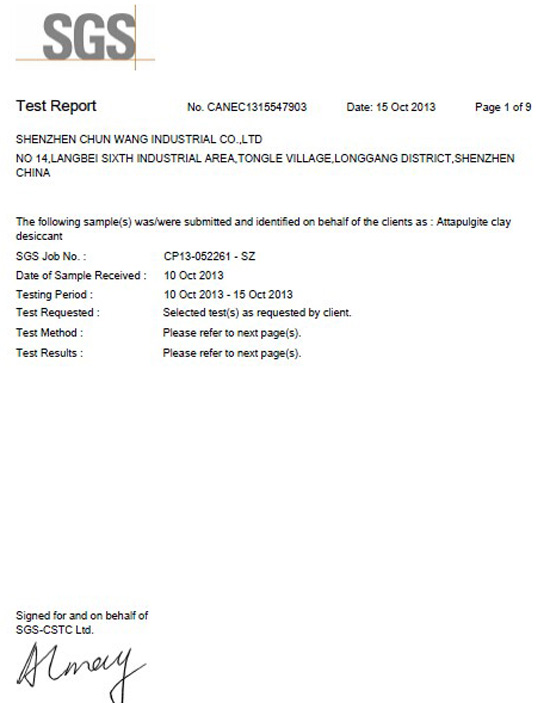What is the main test item for the desiccant RoHS test report? Why can't the desiccant contain DMF? Why do you need to comply with the RoHS regulations?
The desiccant products produced and sold by Chunwang do not contain DMF chemical components, comply with RoHS regulations, and comply with export regulations. Chunwang products are tested by the third-party testing company SGS, and the results are true and effective. After the buyer purchases, the seller can obtain the third-party testing report of SGS testing from the sales personnel. The test items are as follows:

Restricted toxic substances:
·Heavy metal:
–Lead lead;
–Mercury mercury;
–Cadmium cadmium;
– Chromium (VI) hexavalent chromium.
· Some brominated flame retardants:
–Polybrominated biphenyls (PBB’s);
Polybrominated biphenyl
–Polybrominated diphenyl ethers (PBDE’s).
Polybrominated diphenyl ether
The maximum limit indicator is:
· Cadmium: 0.01% (100 ppm);
· Lead, mercury, hexavalent chromium, polybrominated biphenyls, polybrominated diphenyl ethers: 0.1% (1000 ppm).
The RoHS Directive restricts the use of the following six categories of hazardous substances:
1. Lead (Pb) Examples of the use of this material: solder, glass, PVC stabilizer
2. Mercury (Hg) (mercury) Examples of the use of this substance: thermostats, sensors, switches and relays, bulbs
3. Cadmium (Cd) Examples of the use of this substance: switches, springs, connectors, housings and PCBs, contacts, batteries
4. Hexavalent chromium (Cr 6+ ) Example of the use of this material: metal corrosion coating
5. Polybrominated biphenyls (PBB) Examples of the use of this material: PCB, connectors, plastic housing
6. Polybrominated diphenyl ether (PBDE) Examples of the use of this substance: flame retardant, PCB, connector, plastic casing What is
What is DMF?
Dimethyl fumarate is abbreviated as DMF. It has low toxicity (LD_(50) rats are oral 2240 mg / kg), high-efficiency, broad-spectrum antibacterial, and has a special antibacterial effect on mold. It can be applied to mold, bread, feed, cosmetics, fish, meat, vegetables and fruits. The anti-mildew effect of DMF on bread is much better than that of calcium propionate. According to domestic research, DMF has good antifungal ability, and the antifungal effect of feed is better than that of propionate, sorbic acid and benzoic acid. It is used in many PDA medium containing 500-800ppm. The bacteria act as a complete inhibitor.
EU attitude towards DMF: On January 29, 2009, EU member states adopted a draft resolution “Guaranteed that consumer products containing dimethyl fumarate will not be placed on the European market”, which came into effect on May 1, 2009. The draft clearly states that if the content of dimethyl fumarate in consumer products or parts thereof exceeds 0.1 mg/kg, or if the product itself has declared its dimethyl fumarate content, it will be considered as "containing fumaric acid". Dimethyl ester" products, which will be banned from entering the EU market for circulation and sales.
Dimethyl fumarate (DMF) is commonly used as a preservative and anti-mold agent, and is commonly used in the production, storage and transportation of leather, footwear and textiles. However, since October last year, the EU has successively reported many cases of skin allergies, acute eczema and burns caused by consumers' exposure to shoes containing dimethyl fumarate, leather sofas, etc., which has attracted wide attention. The EU also conducted research and analysis since then, and finally introduced the above draft and limited standards. Before the adoption of the EU draft, France and Belgium have taken specific measures to ban the import and sale of shoes and seats containing dimethyl fumarate. Spain has also introduced regulations prohibiting any products that come into contact with the skin from containing dimethyl fumarate. Moreover, since the end of last year, a number of Chinese products have been detained by France and other countries due to excessive levels of dimethyl fumarate. Dimethyl fumarate is widely used in domestic products. A considerable number of footwear, leather furniture and home textile products will be placed in the package with moisture-proof bags containing the ingredients for moisture and mildew proof. In China, leather products in Wenzhou, Haining and other places are traditional foreign trade export products. In Wenzhou alone, the export of footwear products in 2008 reached 276 million US dollars. Textiles are Zhejiang's export-oriented products, with an annual export volume of 40 billion yuan. These exports account for a considerable share of the EU market. What is even more worrying is that according to the data, dimethyl fumarate is widely used in food, food, feed, etc. due to its low toxicity, strong antibacterial ability, many antibacterial substances and environmental protection. Cosmetics, tobacco, etc. are antiseptic, mildewproof and fresh. Therefore, the EU's ban on all consumer products containing dimethyl fumarate will inevitably have a great negative impact on the relevant industries in our province.
Faced with the huge challenge of the ban, the inspection and quarantine department reminded relevant export enterprises to make timely adjustments and switch to more environmentally friendly and healthy moisture-proof and mildew-proof products to meet the requirements of the draft, and actively communicate with foreign customers to reduce the draft. The impact of product exports. Recently, the inspection and quarantine department will also strengthen inspection and supervision of relevant enterprises within its jurisdiction to prevent unqualified products from being shipped to the EU. Therefore, Chunwang's desiccant products do not contain DMF and can pass the RoHS export order, which can avoid the loss of customers' products to the EU, causing great economic and reputational losses.







All trademarks shown here are for reference purposes only. They are the property of their respective owners, and we are not authorized to sell items bearing such trademarks.
